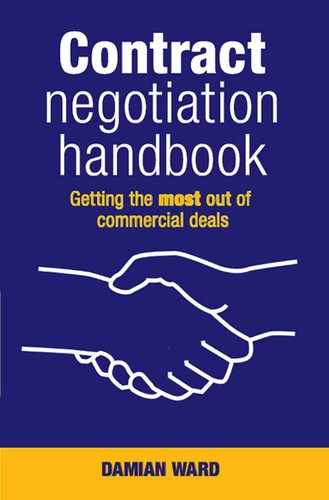Appendix
The cheat sheet
For even the most sophisticated contract negotiator the combination of legal concepts, strategic considerations and theatre that is a negotiation can be intimidating.
Throughout this book I have tried to identify some rules of thumb that tend to operate as mental anchor points if you find you are being overwhelmed or feeling disoriented in a negotiation. Below are some phrases that crystallise these rules. They are:
- Keep in mind the springboard and the safety net — contracts are a combination of entrepreneurialism (the springboard) and a fail-safe system (the safety net).
- You can’t be too prepared for a contract negotiation — the more time you put in before it starts in understanding what precise outcomes you want from the commercial relationship, the closer the contract will actually match your desired reality.
- Be knowing! — by that I mean:
- know what you can do
- know what you can’t do
- know what you’re willing to do
- know what you won’t do
- know what you want
- know what you don’t want.
- Don’t rely on the ‘it will all right on the night’ philosophy — as skilled and intelligent a negotiator you may be, failure to fully think through all issues can mean you make decisions on important contractual issues on the run or impetuously. Impetuous decisions are almost always bad decisions.
- Look at the ‘boring’ parts of a contract — they are a Trojan horse and are significantly more important than they seem.
- If you are the seller, play as straight as you can — given the current state of the law the art of salespersonship still lives, but to a limited extent. Being too ‘enthusiastic’ can cause you problems.
- If you are buying, always keep your senses alert — look for the signs of the overseller. If you develop a sense you are dealing with a person like this listen to them with a critical ear and look at them with watchful eyes.
- During the course of the contract understand the who, the what and the how of your counterparty — knowing the other party to the relationship (be they friend or foe) can only help.
- Knowing the personality, style, commercial context and agenda of your counterparty is important — it can be the difference between a limousine ride or bumpy trip on an off-road track.
- If a dispute is brewing don’t stick your head in the sand — gather as much information as you can at the earliest possible time about the facts and what has given rise to the dispute.
- Assess closely how you deal with the dispute — your approach needs to be strategic and considered.
- In any dispute the smart player knows their strengths and weaknesses in equal measure — without this you can’t see where the leverage is.
- The more you know about the positions of the parties the better off you will be — cast the net wide to gather all details you can but the process is almost as important as the information itself.
- Decide how you want your dispute to be determined cautiously but strategically — unassisted negotiations, mediation or fighting can each have respective strengths and weaknesses. There is no rule — each case is different and should be considered closely and the facts looked at in detail.
- Give away what doesn’t matter — don’t fight every point; it saps energy and resources and will rarely help you get the result you want.
